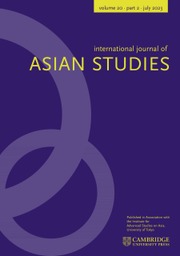Article contents
THE EMERGENCE OF THE PERIYANADU ASSEMBLY IN SOUTH INDIA DURING THE CHOLA AND PANDYAN PERIODS
Published online by Cambridge University Press: 15 January 2004
Abstract
In ancient and medieval south India, from about the fifth century, the term nādu denoted a micro-region which was important as the basic unit of agricultural production. The agricultural community formed in the nādu was called nāttār or nāttavar, literally meaning the people of the nādu. Initially it was exclusively composed of the Vellāla peasantry, but from the eleventh century there began to appear in Tamil inscriptions the term periyanādu meaning “big nādu” to denote a supra-nādu assembly. In this paper we examine the meaning of the emergence of this and other similar supra-local and/or multi-community organizations.
The Chola dynasty, which had ruled south India for about four hundred years, disappeared in the latter half of the thirteenth century. The succeeding Pandyan dynasty was put down in its turn by the invasion of the Delhi Sultan's army at the beginning of the fourteenth century. Therefore, the thirteenth and fourteenth centuries in south India were a period of political turmoil, during when, nevertheless, foreign trade was carried out vigorously in the Indian Ocean. Merchants and artisans joined peasants in the activities of the periyanādu, generating a new state and social formation that became explicitly visible in the fifteenth century under Vijayanagar rule.
- Type
- Independent Papers
- Information
- Copyright
- © Cambridge University Press 2004
- 6
- Cited by




